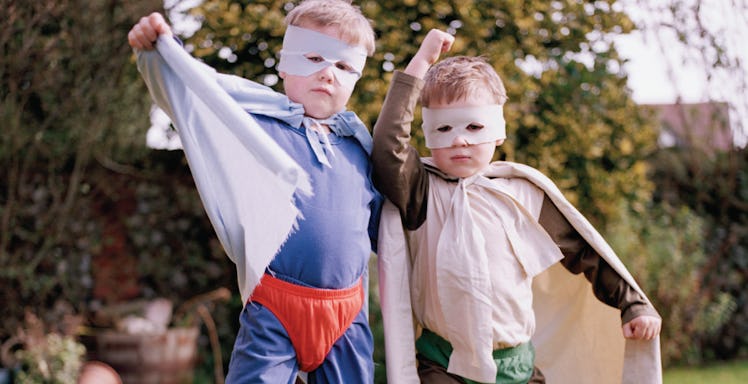Pretending To Be A Superhero Is Good For Your Kid’s Development — Here’s How To Make It Even Better
Your cat will thank you.

You may not realize it, but there are developmental benefits to playing superheroes beyond the joy of running wild in Iron Man underwear, vanquishing the evil forces lurking just beyond the bedroom door — and it’s important for your kids, too. Imaginative play is a cornerstone of how children learn, and few scenes require more imagination to reenact than a soldier in American flag pajamas debating government’s role in superhero oversight with a billionaire inventor in a bionic armored suit.
Dr. J. Alison Bryant is the Chief Play Officer at PlayScience, where she helps everyone from Disney to PBS better understand how kids play. Her own research — not to mention her own 3 Avengers-obsessed kids — bears out what childhood experts have suggested for years: Superhero play empowers kids to feel brave and in control of their world. So, if you’re looking to understand the benefits of playing Civil War with your kids (beyond the obvious excuse not to wear pants), talk to Dr. Bryant.
They’ll Be A Good Person And Feed The Cat
Every superhero story is about saving the world (and violent destruction, but shh). It’s “pro-social,” a term you’re welcome to teach the parent of the playground ant-burner. Kids build their imaginations around characters and concepts they know, and if they know superheroes, their imaginative play involves swooping in at the last second to save their teddy bear from certain doom. This is developmentally significant, first because it’s truly interactive (no screens), and second because, “The more kids act out pro-social roles using those models, the more likely they are to keep doing so.”
What You Can Do With This: Superheroes offer lessons in values that kids actually grasp, so emphasize those during playtime — “Captain America was chosen because he ran to help when stronger people ran away” — and beyond — “It’s Hulk PJs bedtime, but you’re still a hero because it’s about what’s on the inside.” Help them understand the line between fantasy and reality while appreciating both — and doing their chores. “If your kid is all about saving the world as Iron Man, bring it back to saving the cat from being hungry,” says Bryant.
Their Super Power: Agency
Kids’ worlds are controlled by parents, teachers, and various adult overlords, which is great for guaranteeing you get the big piece of chicken, but not so much for your kid’s sense of agency. They figure one kid can’t change the world. Superheroes tend to be individuals who break societal restrictions to do the ultimate good in the world. Acting out superhero stories, then, puts the locus of agency in Junior’s hands, which sounds like something Tony Stark said — “If the Locus Of Agency were to fall into the wrong hands …” — but is actually an important developmental milestone. Plus, since superheroes are typically humans (freakish powers notwithstanding), it’s much easier for a kid to self-identify with a Captain America action figure than, say, a block.
What You Can Do With This: Use superhero play to “level up” your kid’s recognition of how they can better the world: Understand problems, learn about them, and eventually own a cause and advocate for it. “Superhero play lets kids imagine and see that one kid really can make a difference. Even while playing out a scenario as an imaginary superhero, they’re seeing a change within themselves,” says Dr. Bryant.
The Family That Defeats The Forces Of Evil Together …
PlayScience’s research with the Toy Industry Association has shown that parents are less likely to engage with a child in a type of play they don’t understand (Minecraft) than one they get (“Hide And Go Fetch Dad A Beer”). The benefits of actually playing with your kid are plentiful — and obvious: more time to infuse core values, teach, and just spend time together, which Bryant notes is the primary thing kids say they want.
What You Can Do With This: You shouldn’t have too tough a time understanding how to strap on a mask and a shield and go crush the bad guy. Let your kid save you from peril and now they’re playing an adult — that kind of role-reversal is a key facet of imaginative play.
There Goes My Hero, Watch Them As They Go
You’re starting to see more female role models in superhero universes (and galaxies far, far away, and 7 Kingdoms, and you get the idea), and that’s totally badass. But while it’s awesome to see a little girl in a commercial dressed up as Iron Man, a commercial with a little boy playing Scarlet Witch would be just as awesome. To paraphrase Bryant, “We have more work to do, but that’s a great area of opportunity.” To paraphrase a superhero father figure: with great opportunity comes great responsibility.
What You Can Do With This: “Parents will steer boys away from liking female characters, especially dressing up like them, but they aren’t cross-dressing — they just like her superpowers and want to explore them,” Bryant says. “We need to start modeling that.” Let your kid play whoever they want, and take this golden opportunity to remind them that the things that make their heroes super are not gender-specific.
This article was originally published on